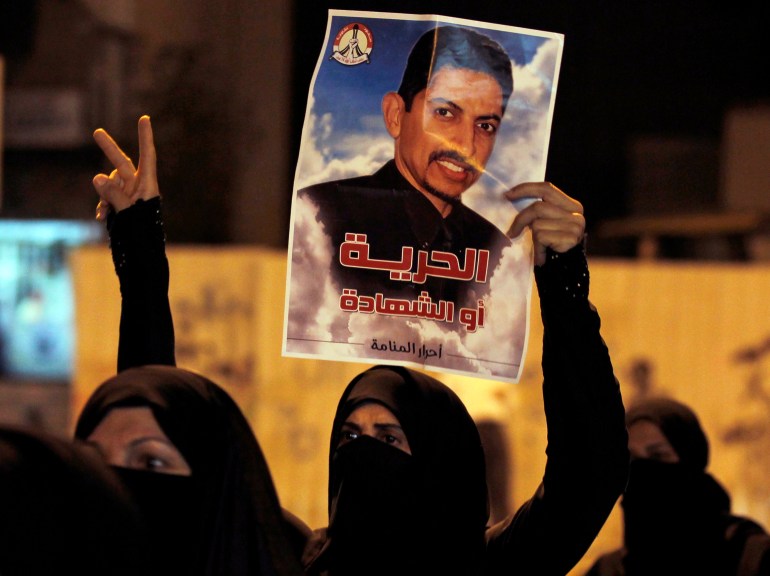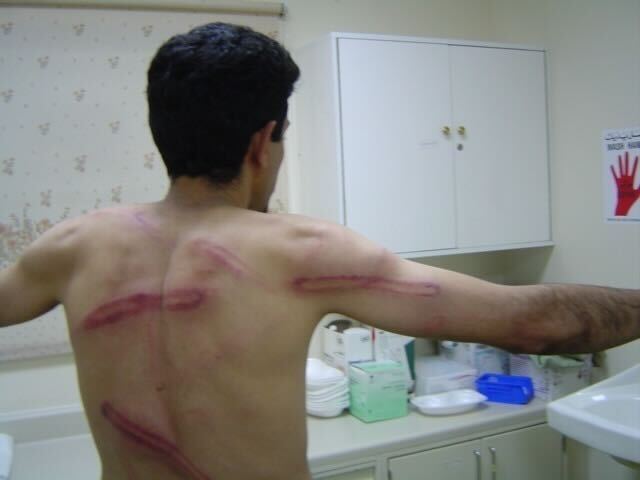The then-secretary general of the Gulf country’s largest leftist political party – the National Democratic Action Society (Wa’ad) – was rounded up alongside other protesting leaders at that time, who were tried and imprisoned by military courts.
“We were tortured severely,” Sharif told Al Jazeera, recounting the beatings and sexual harassment he faced, as well as the electrocutions some of his peers were subjected to.
Shortly after an independent inquiry took place, the opposition leader and others who took part in the massive pro-democracy protests were transferred to the civilian prison system and only then did the torture stop, he said.
Things were markedly better in these prisons for several years, Sharif said, with prisoners able to leave their cells during the day to pray at the mosque, use the library, or play football outdoors.
But conditions deteriorated after a riot broke out in 2015, he said.
Nearly a decade later, prisoners – many of whom have languished in the prison system since 2011 – are confined to their cells for up to 23 hours a day, denied medical treatment, and not given access to education, according to the London-based Bahrain Institute for Rights and Democracy (BIRD).
Some are also kept in solitary confinement, the group said.
As a result of the years of worsening conditions, more than 800 prisoners have been staging Bahrain’s largest-ever hunger strike since early August, with many of the striking political prisoners held in the country’s largest prison, the Jau Reformation and Rehabilitation Centre.
The prisoners’ families have also taken to the streets in protest, demanding the release of their loved ones.
On Monday, after 22 days of the hunger strike, Bahraini authorities met with advocacy groups to discuss reforms. But prisoners say these proposals hardly address their concerns and they have therefore vowed to continue their protest.
“The anger about this injustice is [no longer] a problem behind prison walls. This is now a problem on Bahraini streets,” BIRD’s director of advocacy, Sayed Ahmed Alwadaei, told Al Jazeera.
‘Slow murder’
While Sharif was fortunate to not have spent more than five and a half years in prison, others have been handed life sentences.
Among them is Abdulhadi al-Khawaja, a Nobel Peace Prize nominee who Alwadaei calls a “godfather” of the human rights movement in Bahrain.

“Denial of medical treatment is slow murder,” Maryam al-Khawaja, Abdulhadi’s daughter, who now lives in Denmark, told Al Jazeera. “Yes, the hunger strike puts my father at higher risk of a heart attack. But he was already at risk because they were refusing him access to a cardiologist.”
Abdulhadi al-Khawaja is no stranger to hunger strikes, his longest one lasting 110 days back in 2012.
But now he would not be able to last anywhere near that long, Maryam said, due to the state of his health, which includes suffering from heart arrhythmia, glaucoma and chronic pain due to metal plates in his jaw after numerous beatings by prison authorities, among a number of other issues.

Momentum to continue
According to Alwadaei, the protests have gained momentum, with the number of hunger strikers doubling since the strike began on August 7.
A total 804 prisoners are currently taking part, according to a list of hunger strikers compiled by BIRD, which Al Jazeera reviewed.
Monday’s meeting between the government and advocacy groups has done little to quell the hunger strike.
Minister of Interior General Shaikh Rashid bin Abdullah Al Khalifa met with advocates, including the president of the National Institution for Human Rights and the chairperson of the Prisoners and Detainees Rights Commission, according to a statement by the Ministry of Interior.
The meeting discussed health services for inmates, a revision of the current visitation system, and increasing the allotted daily outdoor time from one hour to two hours.
Al Khalifa also highlighted “the ongoing cooperation between the Ministry of Interior and the Ministry of Education in providing educational programs and services to inmates and facilitating the completion of their studies at all levels”.
But Alwadaei said the meeting has come “too little, too late”, and the government had still failed to concede to the prisoners’ core demands.
“Based on conversations with prisoners following the Interior Ministry statement, it is clear that the hunger strike will continue until the government addresses their concerns seriously and in good faith,” he said. “So far, they have not taken any of the core demands of the striking inmates seriously.”
“The government should not underestimate the fragile condition of the prisoners and the anger in the streets. If a prisoner dies, the situation will be beyond control,” Alwadaei added.
At the time of publication, Bahraini authorities had not responded to Al Jazeera’s request for comment about the allegations of torture and denial of medical treatment to inmates.
Amnesty for prisoners
The strike has garnered concern from Bahrain’s ally, the United States, with a US Department of State spokesman saying earlier this month that it was “aware of and concerned about reports of this hunger strike”.
According to Maryam al-Khawaja, however, Bahrain’s Western allies, including the US, have long overlooked human rights abuses in the country, propping up the Gulf nation and enabling the abuses to occur.
“We wouldn’t be where we are if … the government didn’t receive the kind of support that they get from the West – and that largely looks like them being able to avoid any kind of real international accountability for the crimes that they’ve committed,” she said.
Maryam can still recall the time in 2011 when she says her father was beaten unconscious in front of her and her family when he was arrested.
The uprising occurred while the al-Khawaja family was still living in Bahrain, having moved back there in 2001 after a period of exile in Denmark.
They were able to return at the time because the Bahraini government had issued a general amnesty, releasing all prisoners, and thereby sparking the return of many exiles.
Maryam, who was detained herself and later released after international pressure when she last tried to visit Bahrain in 2014, is hoping for another general amnesty for her father and other prisoners.
Otherwise, she is worried he may die in prison.

It was her father’s ordeal and life-long human rights activism that inspired her to become a human rights defender as well, a similar tale for many others in the region who had met him, she said.
“I’ve met people from the Gulf, who told me that they wanted to go into the field of human rights because of my father, because they met him and he inspired them,” said Maryam.
Sharif, who at one point shared a cell block with the senior al-Khawaja, shares the worry that the prisoners on the hunger strike could die and is undeterred about continuing to speak out against the injustices he himself has endured.
“They have a choice: They can either put me in prison or let me speak my mind. I don’t think they want to put me in prison, so I am speaking freely as much as I [can],” he said.
